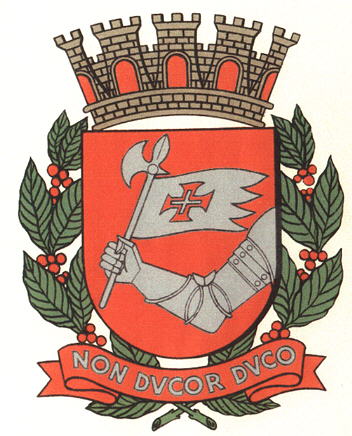São Paulo (São Paulo): Difference between revisions
Knorrepoes (talk | contribs) m (Text replace - "====Origin/meaning :====" to "====Origin/meaning====") |
Knorrepoes (talk | contribs) m (Text replace - "|width="15%"|50 px|right |}" to "|width="15%"|50 px|right |}<seo title="Brasões do Brasil" />") |
||
| Line 3: | Line 3: | ||
|width="70%" align="center" |'''Heraldry of the World<br>Civic heraldry of [[Brazil]]''' | |width="70%" align="center" |'''Heraldry of the World<br>Civic heraldry of [[Brazil]]''' | ||
|width="15%"|[[File:Brazil.jpg|50 px|right]] | |width="15%"|[[File:Brazil.jpg|50 px|right]] | ||
|} | |}<seo title="Brasões do Brasil" /> | ||
'''SÃO PAULO''' | '''SÃO PAULO''' | ||
Revision as of 12:29, 8 November 2012
| Heraldry of the World Civic heraldry of Brazil |
SÃO PAULO
State : São Paulo
Origin/meaning
The arms were granted on March 8, 1917, confirmed on December 9, 1947 and slightly altered on March 5, 1987.
The red field of the arms symbolises the sacrifice and bloodshedding, which has taken place frequently in the history of the city.
The arm alludes to the spirit of the people, ready to fight for their rights, whatever the strength of the enemy, which is symbolised by the axe.
The cross is the cross of the Order of Christ, a symbol used by the Portuguese, and symbolising the fact that the city was founded by the Portuguese. Surrounding the shield are two coffee tree branches, symbol for the importance of coffee for the development of the city.The motto "Non Ducor Duco" may be translated as "I am not commanden, I command."
Literature : Image and background provided by Lauro Ribeiro Escobar, São Paulo.

